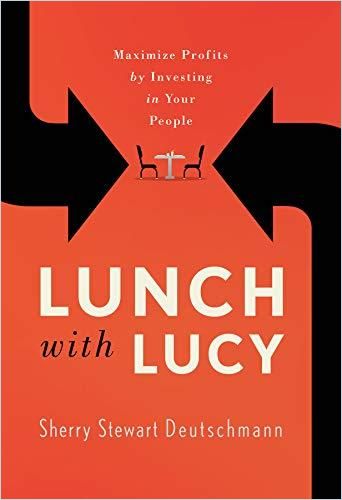Sherry Stewart Deutschmann built a successful company on the principles of empathy, respect and compassion for her employees.

Empathy Breeds Success
Founder of the $40 million dollar company LetterLogic, Sherry Stewart Deutschmann also started Sunset Ventures, an angel investing firm focused on women-owned businesses. Deutschmann explains that she built LetterLogic, an industry leading company, by prioritizing employee welfare above the needs and interests of stakeholders and even customers. This resulted in happy, committed and engaged workers who pulled together to ensure the company’s success.
Deutschmann shares her rags-to-riches story and her “Lunch with Lucy” program, through which she had lunch regularly with a different employees. Her lunches helped her forge personal relationships with her employees and increased her understanding of what they needed to prosper and grow.
Because we only did one thing, we became very, very good at it. It allowed us to be the best in our industry.Sherry Stewart Deutschmann
Deutschmann’s fellow CEOs found much to admire in her approach. Andy Bailey, CEO of Petra Coach, said this book, “will show you a path less traveled and one that will reveal greater fulfillment for both you and your teams.” Loren Feldman, Chief Content Officer of 21 Hats, said that Deutschmann, “actually connects the dots between treating employees well and maximizing profits.’’
Respect
Deutschmann recounts that she moved to Nashville, Tennessee, at age 25, broke, newly divorced and driving a 1976 Volkswagen Rabbit with 200,000 miles on it. She placed third on the TV show You Can Be a Star and realized she wouldn’t make it in the music industry.
She landed a job at a printing company where she made sales calls and pitched in on nights and weekends by cleaning bathrooms and picking up trash. Deutschmann found the staff lackadaisical because management was indifferent to them. She created a plan to engage the staff and improve service, but her boss would not implement it.
Deutschmann identified an unaddressed problem of undeliverable and returned mail in the health care field, so she incorporated a Returned Mail Buy-Back Guarantee into her business plan. She signed two clients, named herself CEO and launched LetterLogic. She bases her business philosophy on being committed to an “employee-centric, empathetic culture.” Her company became immensely successful. She insists that all company policies and actions reinforce the message that every employee matters and deserves respect and support.
Lunch with Lucy
Deutschmann recounts how LetterLogic grew to more than 30 employees working in a 27,000 square-foot factory space. As it grew, she created Lunch with Lucy, a program for having lunch with individual employees and spending informal time with them. Deutschmann established three rules: the employee picked the restaurant, took prominent seats at the table, and could invite his or her co-workers, family or friends.
My strategy for minimizing turnover was to create a work environment where people wanted to stay, even if they were offered more money somewhere else.Sherry Stewart Deutschmann
Face time with employees, Deutschmann discovered, let her convey her appreciation for their work, find out what drives them, discover what inhibits their efficiency and learn what rewards they value most. She found that when employees feel heard and understood they are happier and more productive. They engage better with customers and commit to the organization and its mission.
Deutschmann discloses that she increased her employees’ starting wage to $16.00 per hour. In the 18 months following the raise, Deutschmann announces proudly that LetterLogic’s profitability quadrupled.
Deutschmann views profit sharing as an investment in employee engagement rather than as a reward. She breaks down how she distributed monthly payouts to every employee, from the CFO to the receptionist, and each person received an equal amount: 10% of the bottom line divided by the number of employees.
Deutschmann’s company offered maternity and paternity leave and tuition reimbursement. She learned how much employees value health insurance from her own experience as a young mother who didn’t have it.
Deutschmann highlights the way that home ownership boosts personal finances, and details her company’s First-Time Home-Buyers Gift program. LetterLogic helped 19 employees purchase homes by providing personal loans they could repay through paycheck deductions.
Say No
Deutschmann worries that entrepreneurs are vulnerable to the “yes syndrome” because they worry about missing an opportunity, making a bad impression or losing a chance to meet someone important.
When I reflect on my history as a business leader, it’s easy for me to identify the times I said yes when I should have said no.Sherry Stewart Deutschmann
She advises you to turn down new business if the disruption or investment would create problems. For the same reasons, she says, you should terminate customers who aren’t a good fit. Deutschmann relates how, over time, she learned to say yes only to projects that were worth her energy and her focus and that aligned with her interests and passions.
Empathy
Deutschmann provides a sad commentary on today’s workplace; she built a successful business on empathy, profit-sharing and employee empowerment, yet she presents herself and her company as outliers – which they are. Deutschmann writes with an outsider’s gimlet eye toward the self-aggrandizing language and policies of self-obsessed entrepreneurs. She consistently credits her personal hard times and hard work as the inspirations for being determined that her employees will prosper as she does. Her unpretentious tone and almost mind-blowing lack of hypocrisy or greed make her a role model for this era; every leader or would be leader – especially those leading startups – will benefit from Deutschmann’s hard-earned wisdom and practicality.
Other worthy reads on empathetic leadership include John E. Quinlan’s Alignment Strong; Simon Sinek’s Leaders Eat Last; and Randy Grieser’s The Culture Question.











